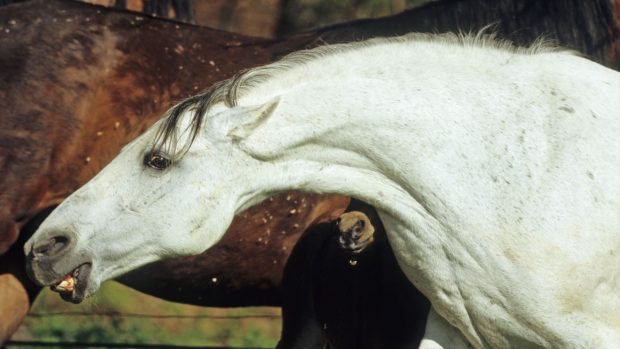When you’ve watched a movie with horses, you have probably noticed that the horses on screen whinny all the time. It comes from the old Hollywood adage “See a horse, hear a horse.” However, it comes as no surprise to anyone who has spent time around real horses that they don’t make that much noise, and when they do, it’s for specific reasons.
Kay Willoughby, an equine behaviourist in Northampton, explains: “Vocalisation in equines is always social behaviour. Horses don’t cry out in pain as this would make them vulnerable.”
She adds that the whinny or neigh, the noise most often heard in movies, “is how horses greet their affiliates, and is also seen with tension, separation anxiety when trying to regain contact like ‘I am here, where are you?’” A horse separated from its herd or moved to a new place where it doesn’t recognise any fellow equines will neigh, and if there are other horses in earshot, they might respond with a chorus of whinnies.
Lynn Bird, a behaviourist based in Cheshire, adds several more reasons why horses whinny.
“Horses generally neigh to attract attention of other horses or of people.” She adds that it can also be “a sign of separation anxiety or a sign of social isolation. In general, increasing pitch and increasing frequency of the sounds making up the ‘call’ indicates increasing arousal, with the squeal commonly heard when meeting a new horse.”
The whinny with which a horse might greet its owner at feeding time has a much lower pitch and frequency than the high-pitched cry of a horse separated from its friend. The animal is much more aroused and stressed in the latter case.
Of course, horses make more sounds than whinnies and neighs.
Kay says: “A nicker is a low, soft sound used by mares as her foal comes to her. It is also the greeting many receive as they approach their horse who may be anticipating a treat. It’s basically an invitation to come closer. It is also part of courtship with stallions and a greeting to members of a herd when coming together.”
While the nicker indicates relaxed social interaction, the high-pitched squeal suggests tense, highly aroused social interaction.
Kay explains: “A squeal can be associated with defensive and aggressive behaviour. Commonly seen when mares are approached and when new horses meet.”
Often the horses will arch their necks and throw out a foreleg. Squeals can also be heard from mares in season, indicating their receptiveness towards the stallion and excitement, or conversely, a mare not in season will try to put off an overeager stallion with a squeal and a kick. According it Lynn, the squeal can mean any “extreme sudden arousal.”
Article continues below…
You might also be interested in:

Why do horses roll? H&H explains…

Horses that snort more are happier, research suggests
Scientists investigated the meaning of equine snorting

Subscribe to Horse & Hound this spring for great savings
Other sounds you might hear are a snort.
“This is associated with alarm or a fear response and alerts the herd of possible danger,” explains Kay. “This will usually be followed by a socially confident individual investigating further and as they approach and circle, and they will blow loudly through their nostrils.”
You might also hear grunts and groans. Kay explains that they “can be associated with pain or exertion, especially in serious combat and olfactory investigation.”
For all the latest news analysis, competition reports, interviews, features and much more, don’t miss Horse & Hound magazine, on sale every Thursday.




